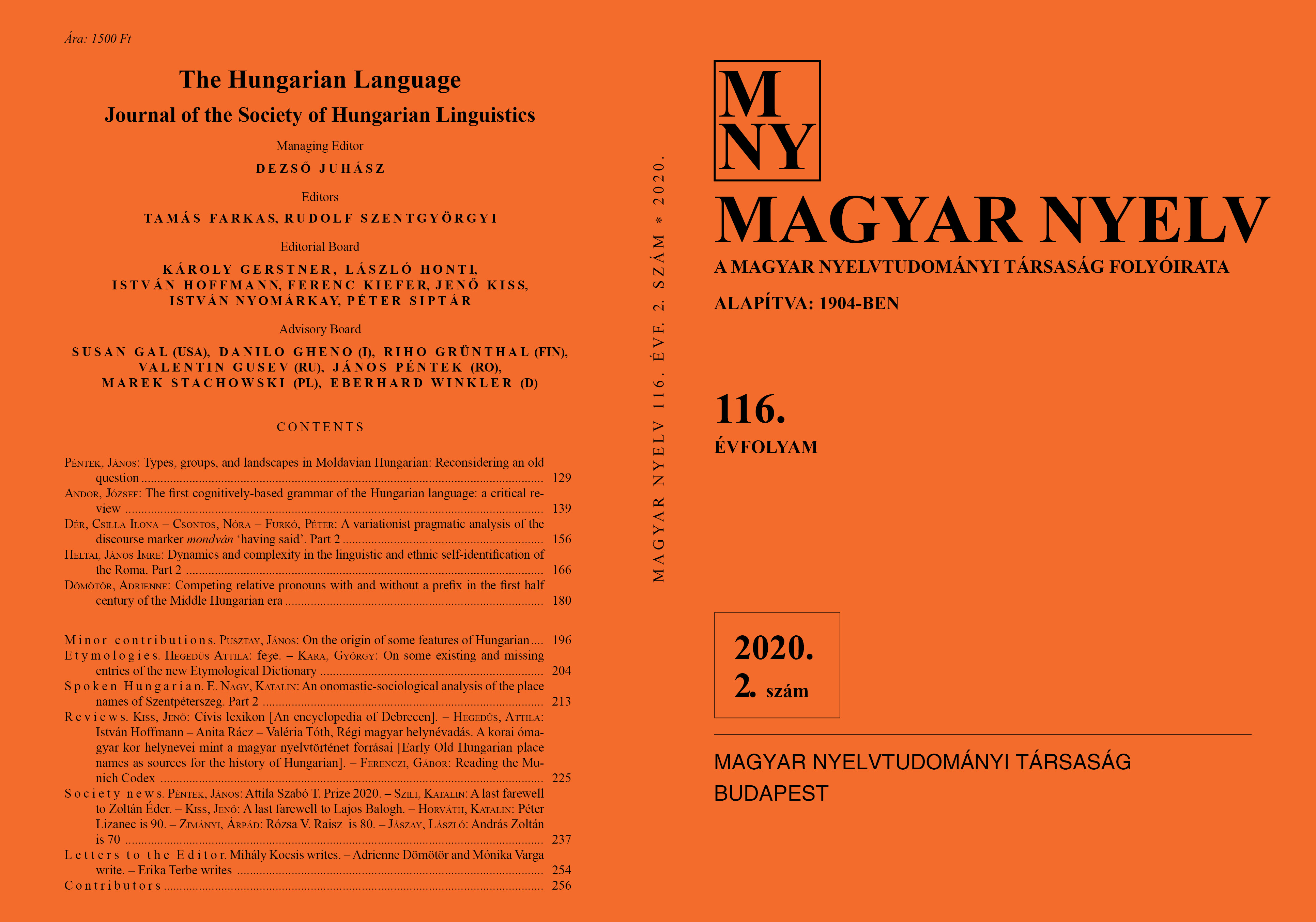A mondván diskurzusjelölő variációs pragmatikai elemzése
2. rész
DOI:
https://doi.org/10.18349/MagyarNyelv.2020.2.156Kulcsszavak:
variációs pragmatika, diskurzusjelölő, diskurzusvariációs elemzés, idézés, magyarázás, szubjektivizálódásAbsztrakt
A tanulmány a mondván „mondván” diskurzusjelölő funkcionális, stilisztikai, formai és regionális változékonyságát vizsgálja a mai magyar nyelvhasználatban. A Magyar Nemzeti Szövegtár (MNSz2) részletes korpuszelemzéséből kiderül, hogy a mondván az írott és beszélt sajtó, valamint az írott beszélt online nyelv tipikus eleme, egyszerre jelöli az idézetet és a magyarázatot (megjegyzés, értékelés, bizonyíték, újrafogalmazás stb.). A regionális és formai különbségek kevésbé egyértelműek, mint a funkcionális és stilisztikai különbségek, ami arra utal, hogy a mondván egy teljes értékű diskurzusjelölő, stabil funkciókkal.
##submission.downloads##
Megjelent
Folyóiratszám
Rovat
License
Copyright (c) 2024 Csilla Ilona Dér, Nóra Csontos, Péter Furkó

This work is licensed under a Creative Commons Attribution-NonCommercial-NoDerivatives 4.0 International License.
A periodika Open Access hozzáférésű (Gyémánt). A dokumentumok elektronikus formában szabadon elmenthetők, másolhatók; változtatások nélkül, a forrásra való hivatkozással használhatók. Az alkalmazás kereskedelmi célokat nem szolgálhat. Bármilyen terjesztési és felhasználási forma esetében az 1999. évi LXXVI. szerzői jogról szóló törvény és az ahhoz kapcsolódó jogszabályok az irányadók. Elektronikus változatára a CC BY-NC-ND (Creative Commons – Attribution-NonCommercial-NoDerivatives) licenc feltételei érvényesek.
A folyóirat a szerzők számára időbeli korlátozás nélkül és díjmentesen engedélyezi, hogy kézirataiknak a szerkesztőség által elfogadott, akár a lektori javításokat is tartalmazó, de nem végleges (ún. pre-print) változatait közzétegyék: e-mailen, a szerző vagy intézménye honlapján, illetve a szerző intézményének, egyetemének zárt vagy korlátozás nélkül elérhető repozitóriumában, illetőleg egyéb non-profit szervereken. Amikor a szerző ily módon terjeszti művét, figyelmeztetnie kell olvasóit, hogy a szóban forgó kézirat nem a mű végső, kiadott változata. Ha a cikk végső változata már megjelent nyomtatott, illetve online formában, mindenképpen javasolt és engedélyezett a szerzőnek ezen (post-print) változatot használnia. Ebben az esetben meg kell adnia a folyóiratbeli megjelenés pontos helyét, adatait is. A szerző a közlemény szerzői jogait megtartja, esetleges másodközlés esetén azonban a cikk első megjelenésének bibliográfiai adatait is közölnie kell.




